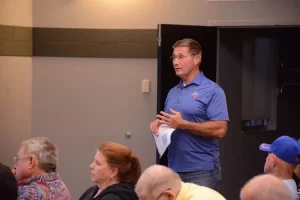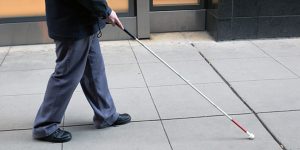
My Dad, Irving Fink, had a client named Jake who needed a lot of help to maintain his driver’s license. This was due to the number of moving violations he accumulated. He addressed Dad as Finkel, rather than Fink. Dad excused this oversight, always explaining that Jake’s previous attorney was named Sharfin, but Jake had always referred to him as Sharfinkel. Dad found some parallelism there and therefore didn’t take it personally.
In preparing him, Dad emphasized, “Jake, they don’t want to know your philosophy on life. They want to know what you would do as a driver in different situations.” J
I met Jake on one or two occasions, either when he had to drop off something at our house, or when I was hanging out in my dad’s downtown law office, as I did once in a while. I can’t picture his face but will always recall the blood-stained white smock Jake wore over his otherwise normal clothing; he owned and operated a kosher butcher shop. His conversations with Dad were sprinkled with Yiddish phrases and his English was accented with Eastern European pronunciations.
Dad enjoyed telling his friends stories about working with Jake, but clearly, it was not easy to be his lawyer. One of his stories was about Jake bringing in a letter ordering him to appear at indiana’s Bureau of Motor Vehicles office, at a specific date and time, to show cause why his driver’s license should not be suspended. Dad went with Jake to this proceeding and introduced himself to the hearing officer. They began with some chitchat about the weather. Trying to build some positive rapport, he asked the officer how long he had been serving. He prefaced his answer by saying that he was a retired sheriff from a nearby county.
Trying to butter him up in hopes of getting his client Jake to receive friendly treatment, Dad commented, “You don’t look old enough to be a retired sheriff. How old are you?”
“I’m sixty-two.”
At this point, the way Dad always told the story, Jake broke in, saying, “you look much older.” That would be only the first of many undiplomatic contributions from the client. Jake’s next step, his own way of “buttering up” the officer, was to say “Tell me, how about I ship you a side of beef?”
Dad didn’t know whether to walk out of the room, pretend didn’t hear, or make some kind of apology on behalf of his client. The officer handled it tactfully, saying “No thanks. That’s not a good idea.”
The officer then got down to business. “I’m going to suspend your driver’s license for thirty days until you pass your driver’s test.” He turned to Dad. “Fair enough?”
“Sure, that’s fair. If he can’t pass the driver’s test, he shouldn’t drive.”
The officer handed Jake a small booklet that contained the information that he would be asked on the written test with an admonition for Jake to study it carefully. After they left, Jake asked what kinds of questions would they ask. Dad invented some questions on the spot.
“If you want to make a left turn, what do you do?” Jake thrust out his left arm in a straight line.
“That’s right. What if you want to make a right turn?”
“A right turn? I honk my horn.”
Leafing through the manual, Dad noticed a prominent box warning drivers to beware of any person walking with a red-tipped, white cane.
“Jake, what if you see a person with a white cane?”
“A vus?” (A what?)
“Oh, a blinder. I vouldn’t hit ‘im.”
“Jake, you’d better study this booklet before you take your test.” He warned Jake not to drive while his license was suspended. Jake shrugged him off. “I’ll drive so careful like a chicken crossing the street.”
A couple of weeks later, Jake said he was ready to take the test. Once again, Dad accompanied. him. He I explained to the examiner supervising the test that Jake needed help with English and suggested that the questions be read to him aloud and allow him to respond orally. The examiner assented. Dad had spent additional time practicing questions with Jake before the test, and was pleased to see Jake get several of them correct But then the examiner asked a question that relied on knowledge of mathematics, not one’s knowledge of the rules of the road.
“Two cars going forty miles per hour have a head-on collision. Is the impact two times, four times or eight times as great as the impact of two cars having a head-on collision while traveling twenty miles per hour?”
In preparing him, Dad had repeatedly emphasized, “Jake, they don’t want to know your philosophy on life. They want to know what you would do as a driver in different situations.” Jake must have kept that counsel in mind. His answer to the question about the impact in a head-on collision was immediate and confident and got right down to brass tacks: “I would stop the car and call the police.”
The flabbergasted look on the face of the examiner was equalled by my father’s reaction. There was one more question about the acceleration required to drive up a steep incline, to which Jake gave a similarly non-mathematical reply. Somehow, in spite of these missteps, the man gave Jake a passing score on his test.
The next hurdle was the road test. The examiner would be riding shotgun, there was no need for Dad to ride along in the back. All he could do was cross his fingers and wish Jake well. Back at his office, he was soon surprised by the cheerfulness of his voice on the phone. “Finkel, give me a mazel tov. I passed the test. I got my license back.”
Who knows? Maybe this examiner, unlike the previous one, appreciated the offer of a side of beef. Or maybe Jake actually knew how to drive. My dad was never quite sure.
Dale Borman Fink retired in 2020 from Massachusetts College of Liberal Arts in North Adams, MA, where he taught courses related to research methods, early childhood education, special education, and children’s literature. Prior to that he was involved in childcare, after-school care, and support for the families of children with disabilities. Among his books are Making a Place for Kids with Disabilities (2000) Control the Climate, Not the Children: Discipline in School Age Care (1995), and a children’s book, Mr. Silver and Mrs. Gold (1980). In 2018, he edited a volume of his father's recollections, called SHOPKEEPER'S SON.




Dale, I love your story about your lawyer dad and his client, the guileless (or not?) kosher butcher!
Reminds me of the driving school instructor whose student knew what both a green and a red light meant.
Then the instructor asked him what a yellow light meant.
“It means step on it, the son of a gun is about to change..” said the student.
I could easily imagine that same dialogue you quoted taking place between Jake and the examiner! Good one.
Great story, Dale. Made me laugh!
Dale, mazel tov to your father for being such a mensch! Wonderful story, full of wit, wisdom and a bit of good humor.
I also got a good laugh, especially when Jake offered the side of beef to the officer. Hard to know whether or not he should have passed his test, but hard not to root for the guy too. Good job recounting the dialog!
Jake sounds like a fun guy! And your image makes me long for a nice slice of brisket…
A great tale, Dale. Your dad sounds like a winner. As for Jake, he seemed to have an instinct for survival. As for the driving examiner, he probably just didn’t want to wind up driving with Jake again on a second road trip. Or, as you say, maybe it was that side of beef after all. Thanks for sharing this story!
My dad—certainly a winner from my vantage point. Left us very little financial inheritance after a career in law that included being a founder of the Indiana branch of the Civil Liberties Union. But oh did he leave an inheritance of humor, poetry (those he recited and those he wrote) and STORIES.